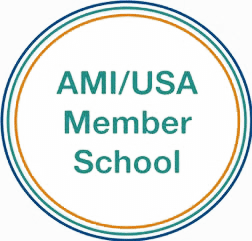It doesn’t take much to realize that, on a fundamental level, young children are very different from older children, let alone adults. Until about the age of six, children have a unique, innate ability to take in everything in their environment in quite an indiscriminate manner. The young mind is like a camera, capturing every piece of information just as it is and turning everything into an opportunity for discovery.
According to Dr. Maria Montessori, that remarkable outlook is what is known as the “absorbent mind.” It is in contrast to the “reasoning mind,” which develops later in life and uses conscious work and memory to learn.
Below, you’ll discover how the concept of the absorbent mind sets the foundation for every Montessori toddler program and how it ultimately impacts the way children learn and grow.
The Four Pillars of the Absorbent Mind
Dr. Montessori identifies four critical pillars that make up the toddler’s absorbent mind:
- Horme: A natural desire for independent exploration that pushes a child to try something until they finally conquer the problem or learn the skill
- Inner Teacher: A hidden, built-in roadmap that steers the child in the direction of the developmental milestones they should be meeting
- Mneme: The superior, subconscious natural memory that stores experiences and uses them to shape the child’s permanent personality and behavior
- Nebulae: The vast potential within each child that is awakened when presented with the right experiences
The premise of a Montessori toddler program is to leverage these pillars by providing the right environment for a child’s absorbent mind to grow and adapt.
How the Absorbent Mind Impacts the Montessori Method
Montessori toddler programs are typically built around the idea of the absorbent mind. Here are just a few of the ways you can see the concept adapted to the toddler classroom:
The Prepared Environment
In any Montessori toddler program, your child will walk into an environment that is prepared especially for them. A classroom guide will have already selected developmentally appropriate materials and activities to awaken the kids’ potential for learning, and they will have the freedom to explore the room independently, allowing their inner teachers to help them choose what they want to work on and learn at their own pace.
Activities span a variety of areas (including practical life, art, sensory, and more) and are designed to be self-correcting to ensure children can feel safe making mistakes and learning independently.
Exposure to Information and Meeting Developmental Milestones
Children in a Montessori toddler classroom are exposed to a variety of different information and experiences that will help develop their curiosity and potential.
During circle time, for instance, children get to experience music, movement, and short lessons on a vast array of interesting topics. Then, later in the day, children are invited to outdoor exploration, where they can run, jump, climb, and play. They can also enjoy sensorial experiences with gardening as well as sand and water tables.
That outdoor sensory play helps children learn and hone their gross motor and coordination skills, allowing them to gain control of themselves and safely move about their environment. Additionally, children learn to care for themselves independently through toilet learning, handwashing, and caring for their environment.
The Absorbent Mind in the Right Environment Leads to Learning and Growth
The concept of the absorbent mind is about much more than children simply soaking up new information. It is a genuine framework that helps adults understand how children learn from (and are shaped by) interactions between their inner subconscious and external experiences.
If such a concept sounds like something you would like to explore for your child, our team at Montessori West can help. Contact us today to learn more about our Montessori toddler program and how our approach can help plant the seeds for a lifelong love of learning and growth.
